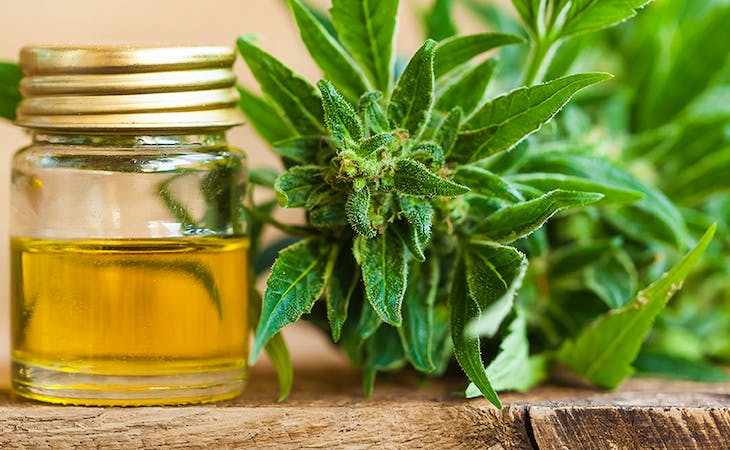Just about everything—electronics, social plans, pain, anxiety, work, sleep disorders—can interrupt a good night’s rest. That could be why people are willing to try close to anything to get some quality shuteye.
“Many of us are interested in alternative or natural treatments for better health and wellness—in general, and for sleep specifically,” says Terry Cralle, RN, certified clinical sleep instructor.
Cannabidiol (CBD) has become one of the buzziest natural sleep remedies. “With marijuana gaining more social acceptance as states legalize it, CBD products are becoming increasingly popular,” Cralle says.
But what exactly is CBD, how is it used, and can it truly help you sleep better? We asked experts to explain.
What is CBD, exactly?
Cannabis (the plant otherwise known as marijuana) contains a host of chemical compounds that can affect your body’s systems in a variety of ways. The most highly recognized compounds in cannabis are tetrahydrocannabinol (THC) and CBD, but each has very different effects.
THC binds to certain receptors in your brain, triggering that euphoric feeling known as a “high.” CBD, on the other hand, is nonpsychoactive: It interacts with different receptors in your brain and body to put you into a more relaxed state, but it doesn’t get you high.
How does CBD work?
There’s still a lot to learn about CBD and how it affects your body, as research is still in its infancy. In fact, it wasn’t until December 2015 that the Food and Drug Administration (FDA) eased regulations so that researchers could conduct CBD trials in the U.S.
What scientists have discovered so far mostly has to do with how CBD affects your body’s endocannabinoid system. Your endocannabinoid system helps regulate everything from your sleep/wake cycle to appetite, mood, and perception of pain.
CBD interacts with your endocannabinoid system and changes the activity of neurotransmitters, hormones, and other cells in your brain and body. For example, Vahid Salimpour, MD, a doctor with Canada-based Apollo Cannabis Clinics, notes that high concentrations of CBD can activate serotonin receptors in the brain, which is potentially why CBD could help people with anxiety and depression.
As of right now, there’s a lack of randomized controlled double-blind studies (the gold standard) on CBD—but a few small studies exist pointing to potential medicinal benefits of CBD. These studies suggest that CBD has anti-inflammatory and antioxidant properties and may be a promising treatment to help manage autoimmune diseases, chronic pain, and more.
CBD and sleep: What’s the deal?
It’s hard to say for sure whether CBD can actually help you sleep better. While some preliminary research suggests that CBD may help with insomnia, sleep apnea, daytime drowsiness, and pain, other research is mixed. For example, one 2018 study published in Frontiers in Pharmacology found that CBD didn’t have much of any effect on sleep.
While some research has found that synthetic cannabinoids could effectively treat post-traumatic stress disorder (PTSD)-related insomnia and nightmares, other studies find discrepancies in dosing, suggesting low-dose CBD could have a stimulating effect, while high-dose CBD could have a sedating effect, Cralle says.
What most experts do agree on: CBD is generally adequately safe, and most people tolerate it well. Many doctors have even seen the CBD benefits firsthand.
“I personally do believe CBD has the ability to help with different types of sleep disorders, particularly those that are secondary to anxiety, depression, PTSD, and chronic pain,” says Salimpour. “I have seen how CBD can be helpful in reducing sleep difficulties and improving sleep quality in patients with fibromyalgia, chronic fatigue, and even in some patients suffering from primary insomnia.” (Learn about CBN, another type of cannabis, and whether it can help you sleep better.)
How to use CBD for sleep
First thing first: Always consult a medical professional before adding any new supplement to your routine, CBD included. While CBD isn’t known to have any side effects (and you can’t overdose on it), it’s always best to check with your doctor about whether CBD could interact with any current medications you’re taking. (Harvard Medical School notes that CBD may have a blood-thinning effect), so it’s especially important to talk to a doctor before using if you’re on blood thinners.)
Once you’ve done that, there are a few things to consider. First is where your CBD comes from. CBD can be extracted from the marijuana or hemp plant or made synthetically. Per Consumer Reports, any plant with less than.3% THC in it is considered hemp by the U.S. government and can legally be used to make CBD products in most states, while any plant containing more than.3% THC is considered marijuana. The government can restrict the sales of products made with the marijuana plant even in states where it’s legal.
Next, think about what form you’d like to try CBD in. Today, CBD is available in different forms for medicinal usage: dried cannabis, edible oils, and gel capsules, says Salimpour. One of the most readily available forms of CBD is ingestible CBD oil.
If you’re going to try CBD oil for sleep, it’s important to know that it’s not currently regulated by the FDA—which means it can be hard to know what you’re truly getting, Cralle says. One way to take some of the guessing out of what’s really in your CBD is opting for a product that’s been tested in labs and certified organic. According to Project CBD, a non-profit educational organization in California organic CBD “offers the best safety profile.”
The best way to use CBD for sleep is to start gradually. “I always recommend the ‘start low and go slow’ rule to my patients to make sure they will get the best results at the lowest therapeutic dose,” says Salimpour. He notes that while it depends on the patient, 4-5 milligrams of CBD is considered a starting dose.
The bottom line: If you’re interested in trying CBD for sleep, consult a physician who has experience with CBD to determine dosage and the best product for you, Cralle advises.




